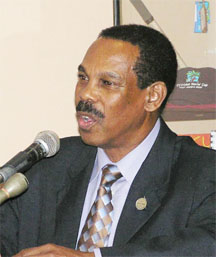CARICOM/PAHO Adviser Dr. Edward Greene has urged that drug abuse be treated as a human rights issue that warrants an urgent regional approach toward prevention in the face of the threat to sustainable economic and social development.
Universal prevention as a principle, Greene said, converges with human rights, in so far as to respect human rights means that governments cannot violate the rights of individuals and that to fulfil human rights the governments must take budgetary, legislative, administrative and judicial measures to ensure the full realisation of the rights of the individual. “Clearly then drug use and abuse are human rights issues,” he said, while delivering the Sir Philip Sherlock Distinguished Lecture on “Preventing Drug Abuse: Interfacing medical, legal and cultural responses with a Human Rights Vision” in Jamaica last month.
He was the 2011 Recipient of the Sir Phillip Sherlock Distinguished Award for Distinguished Service in the Area of Health and Develop-ment, at the 17th Annual Conference of the University Diabetes Outreach Pro-gramme in Ocho Rios, Jamaica, held on March 25.

In his lecture, Greene noted that the international community and the international drug control bodies were until recently largely responsible for the state’s human rights violations, especially against young people who use and abuse drugs as well as those who are vulnerable to drug abuse. He said this was owing to their focus on drug supply reduction. Using a human rights framework, he said it was predictable that the violation, especially of young people’s human rights can increase the use and abuse of substances as well as decrease the chances of appropriate treatment. “What is required is for the international response to drug abuse to be more effective in terms of the integration of human rights principles with obligations,” he said.
Greene argued that the most effective result can be achieved when implementation of the respective strategies hinges on principles of universal prevention that address ‘licit’ and illicit drugs together, based on lessons learned from other areas, and in particular HIV. He noted that studies show that early initiation or intense use of drugs of any kind is the most immediate risk factor. He further said that unlike selective prevention that targets vulnerable groups or indicated prevention that targets individuals, universal prevention addresses social, formal and cultural norms about alcohol, tobacco and cannabis. He said it also deters or delays the onset of substance abuse by providing individuals with the information and skills necessary to prevent the problem and would be applied to all members of the population who share the same general risk for substance abuse, despite the varying risks among individuals.
Greene also noted the advantages of the rapid developments in ICT, which he said foster interaction between and among countries and programmes and reach out instantly to Caribbean people simultaneously and connect them up with activities in the rest of the World. “The power of the social media and the creative zeal of the youth are fully demonstrated as I speak in the Middle East and elsewhere in the globe,” he said, while adding that the Caribbean could harness such power to contribute to worthy causes such as the prevention of drug abuse.
Additionally, he emphasised the importance of functioning legal systems and the enforcement of laws, adequate international funding, and international assistance in addressing the powerful influence of harmful media on young people.
Greene said he remained optimistic that universal prevention of drug abuse could be achieved within a defined timeline, but he emphasised that there is need for practical steps toward a collective regional approach around an agreed strategic framework, involving all stakeholders.
He identified the establishment of the Caribbean Public Health Agency (CARPHA), which will consolidate five health institutions (CAREC, CFNI, CHRC, CEHI and CDTRL) in one agency, as offering a focal point for medical implementation. CARPHA is due to become a legal entity by July 2011. “It offers the prospects of being the quintessential illustration of functional cooperation,” Greene said, while noting that it would embrace all the requisite public health functions, including surveillance, response to health emergences, research, training and leadership.
He also highlighted other “building blocks” within CARICOM for the launch of a useful programme for drug abuse prevention. These include the recent launch of Drug Treatment Courts as an alternative that emphasises prevention over incarceration; the agreement by 11 Carib-bean universities on the priorities in the curricula for undergraduate and graduate programmes in drug abuse and drug prevention accompanied by research and outreach activities; the initiation of a joint CARICOM/ UNODC crime prevention programme aimed at the youth, including the involvement of the education, health, culture and youth sectors is a critical element of drug demand reduction; and the establishment of the Caribbean Basin Security Initiative (CSBSI) in collaboration with the US.
He said these initiatives are complemented by the CARICOM Strategic Framework for Drug Demand Reduction, which was approved by CARICOM’s Council for Human and Social Develop-ment in 2009, and the Hemis-pheric Drug Strategy pioneered by the Inter-American Drug Abuse Control Commission (CICAD) in collaboration with the OAS.
In addition, CARICOM has established the Implemen-tation Agency for Crime and Security (IMPACS) and has established the Council for Security and Law Enforce-ment (CONSLE) and has made crime and security the fourth pillar of the Commu-nity alongside trade and economic integration, foreign and community relations and human and social development, Greene noted.





